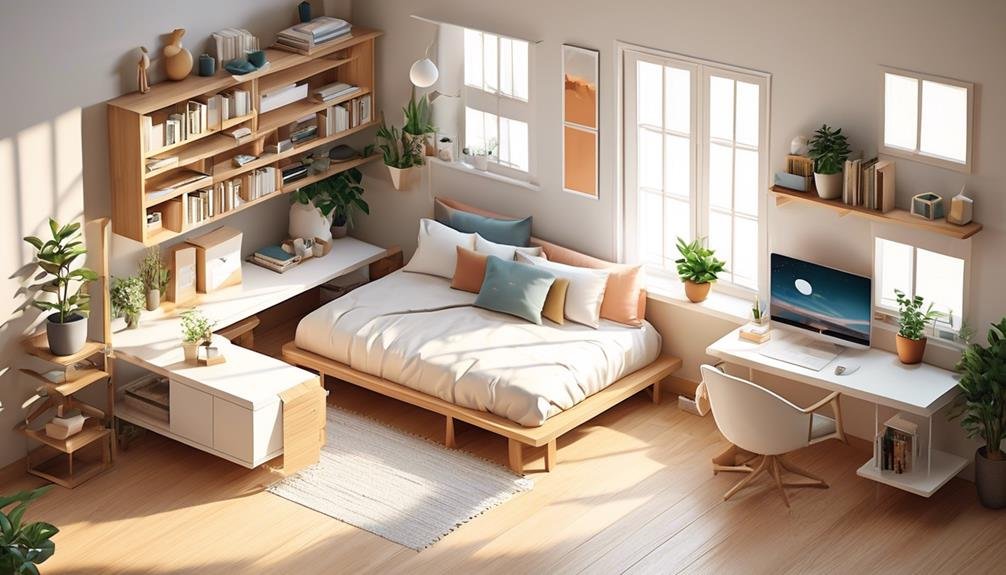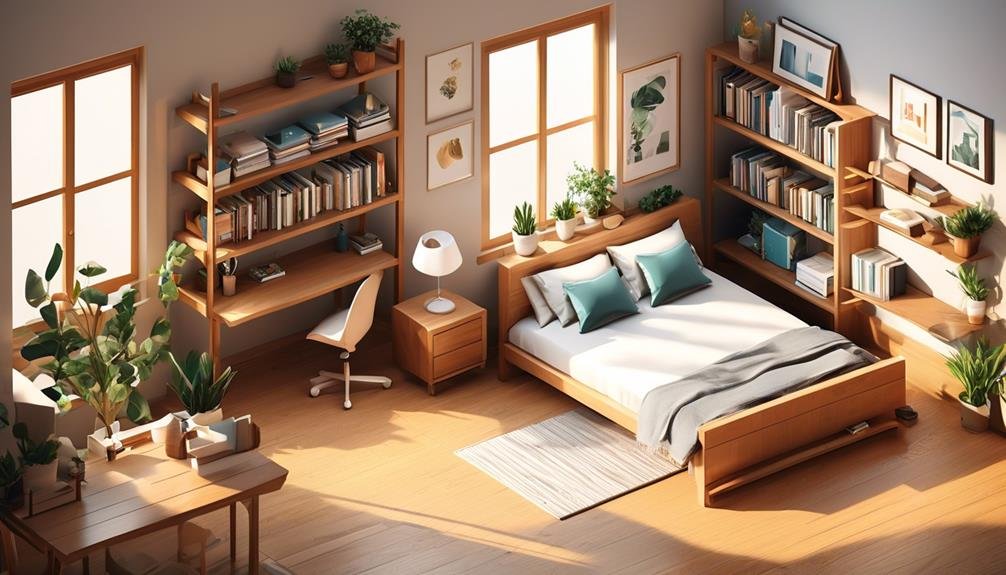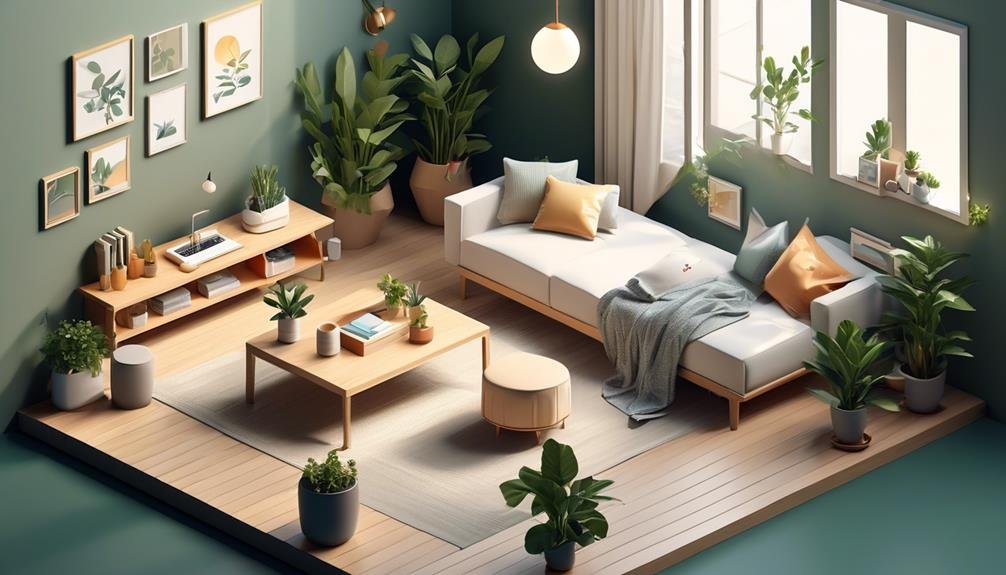Have you ever felt like you were drowning in a sea of chaos, struggling to keep your head above water?
Well, imagine if you could magically transform that overwhelming mess into a serene oasis. It may seem too good to be true, but by minimizing clutter, you can experience a profound shift in your everyday stress levels.
In this discussion, we will explore the fascinating relationship between clutter and stress, uncover the benefits of decluttering, discover practical tips for organizing your space, and uncover the secrets to sustaining a clutter-free lifestyle for long-term stress reduction.
So, if you're ready to reclaim your peace of mind and create a calmer environment, then let's embark on this journey together.
Key Takeaways
- Minimizing clutter can lead to reduced stress levels in everyday life.
- A clutter-free environment promotes increased productivity and improved mental clarity.
- Decluttering can help prioritize self-care and overall well-being.
- Creating a calming and organized space through decluttering can have long-term benefits for stress reduction.
The Relationship Between Clutter and Stress
Minimizing clutter in your everyday life can significantly reduce your stress levels. The relationship between clutter and stress is more significant than you might think. When your physical space is cluttered, it can create a sense of chaos and overwhelm, which can lead to increased stress levels. Clutter can also make it harder to find things, causing frustration and wasting valuable time. Additionally, clutter can serve as a constant reminder of unfinished tasks or responsibilities, adding to your mental load and contributing to stress.
Studies have shown that living in a cluttered environment can have negative effects on your mental health. Clutter has been linked to increased levels of cortisol, a stress hormone, in the body. It can also make it more difficult to relax and unwind, as a cluttered space can feel visually and mentally cluttered as well.
On the other hand, a clean and organized environment can promote feelings of calm and relaxation.
Benefits of Minimizing Clutter on Stress Levels
After understanding the negative impact of clutter on stress levels, it's important to explore the benefits that come with minimizing clutter in your everyday life. By decluttering and organizing your living space, you can experience the following benefits:
- Reduced stress: Minimizing clutter helps create a calming environment, allowing you to feel more relaxed and at ease. With less visual and mental distractions, your mind can focus on what truly matters.
- Increased productivity: A clutter-free space promotes better concentration and productivity. You can find things easily, stay organized, and complete tasks more efficiently, leading to a sense of accomplishment and reduced stress.
- Improved mental clarity: A cluttered environment can contribute to a cluttered mind. By minimizing clutter, you create space for clearer thinking and decision-making. This can lead to reduced anxiety and a greater sense of mental well-being.
- Enhanced self-care: Minimizing clutter can improve your overall well-being. It allows you to prioritize self-care activities by creating designated spaces for relaxation, exercise, or hobbies. Taking care of your physical and mental health becomes easier when your environment supports and encourages it.
Practical Tips for Decluttering Your Space

To effectively declutter your space and minimize stress, consider implementing these practical tips:
| Tip 1: Start small | Tip 2: Set a timeline | Tip 3: Sort and categorize | Tip 4: Establish a system |
|---|---|---|---|
| Begin by tackling a small area or category, such as a drawer or a closet shelf. This helps prevent overwhelm and allows you to see immediate progress. | Set specific deadlines for each decluttering session. Breaking the task into manageable chunks and giving yourself a timeframe helps maintain motivation and prevents procrastination. | Sort your belongings into categories like keep, donate, sell, or discard. This helps you make decisions more efficiently and ensures items find their proper place. | Once you have decluttered, establish a system to maintain order. Use storage solutions like shelves, containers, or labeled bins to keep items organized and easy to find. |
Creating a Calming Environment Through Organization
Create a calming environment by organizing your space effectively. By decluttering and arranging your surroundings, you can create a peaceful and tranquil atmosphere that promotes relaxation and reduces stress. Here are four practical ways to achieve this:
- Clear the clutter: Start by removing any unnecessary items from your space. Clutter can be overwhelming and distracting, so it's important to clear out things that you don't need or use regularly. This will help create a sense of openness and calmness in your environment.
- Establish designated areas: Assign specific areas for different activities or items. For example, create a designated workspace for your work-related tasks and a separate area for relaxation. By having designated spaces, you can maintain organization and easily find what you need when you need it.
- Use storage solutions: Invest in storage containers, shelves, and organizers to keep your belongings neatly organized. Utilize these solutions to store items that are frequently used but need to be out of sight. This will help reduce visual clutter and create a more serene environment.
- Maintain a daily cleaning routine: Incorporate regular cleaning habits into your daily routine. Take a few minutes each day to tidy up your space, put things back in their designated spots, and wipe down surfaces. This simple practice will prevent clutter from accumulating and maintain a calm and organized environment.
Sustaining a Clutter-Free Lifestyle for Long-term Stress Reduction

In order to maintain a clutter-free lifestyle and experience long-term stress reduction, it is essential to establish consistent organizational habits. By incorporating these habits into your daily routine, you can ensure that your environment remains tidy and stress-free. Here are some practical tips to help you sustain a clutter-free lifestyle:
| Establish a Cleaning Schedule | Create a designated cleaning schedule to keep your space organized and clutter-free. Set aside specific times each day or week to tidy up and put things in their proper place. Stick to this schedule to prevent clutter from building up again. |
|---|---|
| Use Storage Solutions | Invest in storage solutions that fit your needs and help you stay organized. Utilize bins, baskets, and shelves to store items neatly and keep them easily accessible. Keep similar items together to avoid confusion and save time when looking for something. |
| Declutter Regularly | Make decluttering a regular habit. Set aside time each month to go through your belongings and get rid of anything you no longer need or use. This will prevent clutter from accumulating and ensure that your space remains clutter-free. |
| Practice Mindful Consumption | Be mindful of what you bring into your space. Before purchasing something new, consider if it will add value to your life and if you have space for it. Avoid impulse buying and focus on acquiring only the things you truly need and love. |
Frequently Asked Questions
How Does Clutter Affect Other Areas of Our Lives Besides Stress Levels?
Clutter affects other areas of your life besides stress levels. It can decrease productivity, increase feelings of overwhelm, hinder decision-making, and create a chaotic environment. Minimizing clutter can help improve these areas.
Are There Any Negative Effects of Minimizing Clutter on Stress Levels?
Minimizing clutter can have positive effects on stress levels. It allows for a sense of calm and organization, reducing the daily stressors that can accumulate. However, it's important to find a balance and not obsess over decluttering, as it can also cause unnecessary stress.
Can Decluttering Your Space Have a Positive Impact on Your Mental Health?
Decluttering your space can have a positive impact on your mental health. By removing excess items and creating a more organized environment, you can reduce stress levels and promote a sense of calm and clarity.
Are There Any Specific Techniques or Strategies for Creating a Calming Environment Through Organization?
To create a calming environment through organization, try techniques like decluttering, organizing items by category, and creating designated spaces for everything. These strategies can help reduce stress and create a sense of calm in your space.
How Can We Sustain a Clutter-Free Lifestyle in the Long Term to Maintain Reduced Stress Levels?
To sustain a clutter-free lifestyle long term and maintain reduced stress levels, you can develop a routine for decluttering regularly, set realistic goals, and practice mindful consumption. These habits will help you maintain a calm and organized living environment.
Conclusion
In conclusion, minimizing clutter can have a significant impact on reducing everyday stress levels. By decluttering your space and creating a calming environment, you can create a more organized and efficient living space.
Implementing practical tips for decluttering and sustaining a clutter-free lifestyle can lead to long-term stress reduction. So, take the time to declutter and enjoy the benefits of a more serene and stress-free environment.





